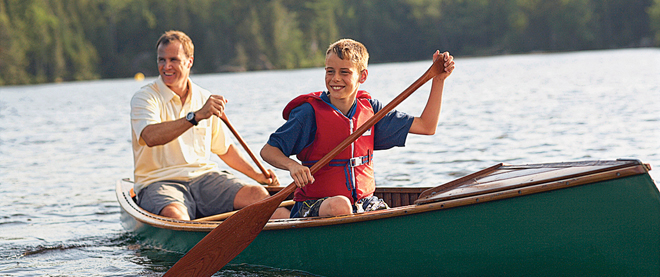Ottawa shouldn’t go overboard on life jackets
Ottawa cannot be expected to remove all possibility of risk from our lives
Getty Images; Darryl Dyck/CP
Share

Coureurs de bois were Canada’s original action heroes. These rebellious bushrangers of New France rejected official efforts to control the entire beaver trade. Ignoring the need for a government fur licence, they took to canoes and sought adventure and profit on their own in the deepest woods. That freedom so many Canadians find in a summer spent camping or canoeing can be traced back to the coureurs de bois and their spirit of independence. Not to mention their lack of a mandatory life-jacket law.
It is once again boating season in Canada. And once again Canadians face the prospect that the federal government may decide to force every boater in the country to wear a life jacket.
Both the National Recreational Boating Advisory Council and the Canadian Safe Boating Council have been discussing mandatory life jackets for recreational boaters for many years. The CSBC is devoting an entire day to the subject at its annual meeting this September. A recommendation to Ottawa favouring a new law now seems inevitable. And the Ontario Provincial Police, Canadian Red Cross and Canadian Lifesaving Society all regularly demand mandatory personal flotation devices for anyone in a power boat or canoe.
Certainly every death by drowning represents a tragedy deeply felt by family and friends. But the question of whether or not a mandatory life-jacket law makes sense requires real evidence, not emotion. In fact, Canadians are making remarkable strides in water safety without any new life-jacket law.
The most recent data on drowning in Canada comes from a Transport Canada/Canadian Red Cross report released last year covering the period from 1991 to 2006. Despite its boosterish tone in favour of a life-jacket law, this report actually presents a convincing argument to the contrary.
In the first five years of study, from 1991 to 1995, 873 Canadians drowned while recreational boating. In the next five years, 718 Canadians drowned under similar circumstances. Between 2001 and 2005, the number of fatalities fell further to 555. Judging from the most recent statistics available, the next five years will continue this strong downward trend. Canada’s lakes, rivers and oceans are becoming noticeably safer from all perils. The annual incidence of all types of fatalities while boating (including drowning, hypothermia and trauma) has nearly halved over the past 16 years: from 0.84 per 100,000 population to 0.45.
To look at these statistics another way, consider if a mandatory life-jacket law had been introduced by Ottawa back in 1991. The inevitable conclusion today would be that the law had saved hundreds of lives. It would be heralded as a signature triumph of government initiative. In the absence of such a law, however, the actual evidence shows that Canadians themselves are already doing a remarkable job saving their own lives.
It makes sense for poor swimmers, children and anyone drinking alcohol to wear a life jacket while in a boat. (And of course drinkers should never drive.) Since existing law already requires sufficient flotation devices for all boat passengers, Canadians currently have the option to take this precaution if they so choose. But that decision should ultimately rest with the individual. Ottawa cannot, and should not, be expected to remove all possibility of risk or uncertainty from our lives. As a matter of fact, more Canadians drown in their tub than from a fall from a boat. Will mandatory bathroom PFDs be next on the agenda?
Turning a sensible recommendation on life-jacket use into an absolutist command would represent yet another bothersome and unnecessary intrusion into everyday life by a government that ought to have better things to do. If Canadians can’t find freedom in a canoe in the woods, then it can’t be found anywhere in Canada.
Great Canadian Faceoff
Maclean’s is searching for everyday Canadians with familiar faces, like Michael Kirkpatrick, an investment adviser in Ottawa, who is often mistaken for Liberal MP Justin Trudeau. Politicians, celebrities, sports stars or public figures: if you look like them, we want to see the photographic evidence. For more details, check macleans.ca/faceoff, or email your photos to [email protected]. Winners will be announced this summer.